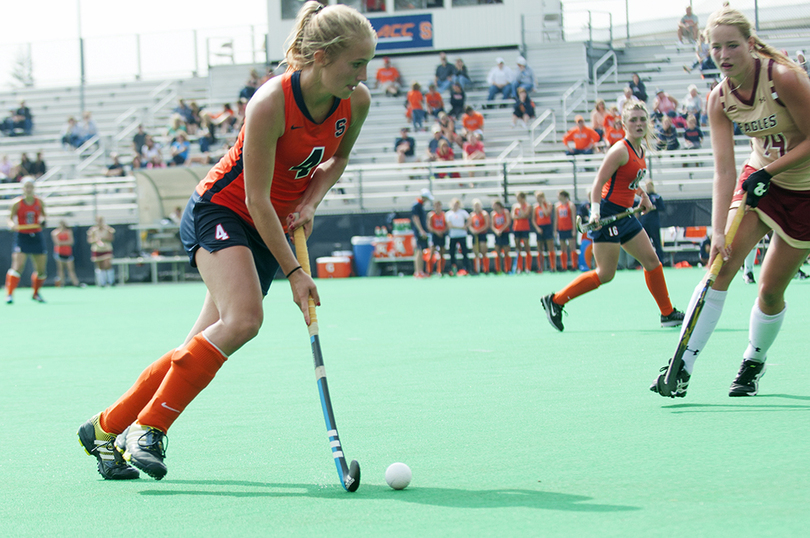How 3 former Syracuse female athletes are continuing their careers overseas

Lieke Visser is one of three former Syracuse female athletes playing professionally overseas this fall. Jessica Sheldon | Staff Photographer
This summer, Rakeem Christmas, Chris McCullough and Alex Bono all had their face on national TV after going from Syracuse to the pros. The former big-name Orange male athletes were each drafted into the top American professional leagues in their sport.
But for three former SU female athletes who also turned pro, they’ll be across the Atlantic Ocean. Lieke Visser (field hockey), Allie LaCombe (ice hockey) and Lindsay McCabe (volleyball) know they’re not in the spotlight. But each has found a professional team in Europe, showing that athletic futures after Syracuse female sports do exist.
Lieke Visser, Wageningen, Netherlands

Unlike LaCombe and McCabe, Visser didn’t graduate from SU. Though she had 11 goals and 17 assists in her one year in orange, she won’t get paid to play professionally and she’ll still attend college in the Netherlands. Her team is completely independent from the school even though they have the same name.
As a freshman last year, Visser said the fitness-oriented practices and watchful eye over her at SU were too much.
“My life will be less controlled by other people!” she said via Facebook message. “I mean that because university and sport was connected, they knew everything I did, every class I wasn’t attending, every grade, they knew who my friends were etc. They were my second mom and I hated it.”
Visser says being 18 and not being paid to play isn’t the worst scenario – she hopes to change clubs and get paid after she gets her Bachelor’s Degree in Society and Health.
“Who doesn’t want to do what she loves and make enough money to enjoy life?” she said. “Unfortunately, with field hockey, that is not possible.”
But the schedule of a non-paying profession – only training three times a week in the evening and having one game on a weekend – is how Visser prefers it.
Field hockey is the second most popular sport in Netherlands behind soccer, Visser says, but clubs are just starting to make enough money to pay athletes more. For now, though, she’ll stick with a lifestyle that isn’t possible in America.
Allie LaCombe, EHV Sabres, Austria

Two months ago, LaCombe was interning with the Fort Myers Miracle, the Class A Advanced minor league baseball affiliate of the Minnesota Twins. She didn’t plan on ending her summer at professional hockey tournaments in Slovakia and Germany.
Playing the sport after college was always her dream, but she didn’t know if it was possible.
LaCombe led the nation in faceoff percentage her senior year, but she’s always desired a career in sport management – she’s worked with the Miracle, the NHL’s Pittsburgh Penguins and SU Athletics. But when a girl from her home state of Minnesota who played in the same league as the EHV Sabres told LaCombe the team had an opening, she contacted the coach, sent highlight tapes and eventually signed the contract.
“It was kind of a different process than college was,” LaCombe said. “Usually colleges find you but this, I kind of found them.”
LaCombe only plans to play one year in Austria since she wants to return to her desired profession, but sees it as a chance to gain insight into the inner workings of a professional team.
The National Women’s Hockey League in the U.S. is entering its inaugural season this fall, but financial restrictions prevented LaCombe from attending tryouts for the league and staying in the United States to play.
Regardless of how long she sustains her career or where she’s playing, LaCombe takes pride in her profession despite its lack of recognition.
“To say that you played professionally as a woman, I mean, it’s such an honor to me,” LaCombe said. “It’s not like I’m going to the NBA or the NHL but it’s pretty cool to say.”
Lindsay McCabe, Béziers Volley, France

McCabe is well aware of Americans’ perception of a professional volleyball career.
“Like, oh professional level, it’s not like a very common thing,” she says.
But playing with five international players at Syracuse last year and facing talented opponents from overseas, McCabe knew otherwise.
“In Europe, it’s the opposite.”
She got a second-hand look at why the volleyball culture in Europe is comparable to that of a major sport in the U.S. It inspired a process that started with SU head coach Leonid Yelin helping McCabe construct a 15-minute highlight tape on YouTube and video of her playing a full game.
Yelin reached out to coaches he knows overseas and showed them film, gauging the level of interest McCabe could garner. Based on their feedback, he then contacted coaches from prospective teams to get a sense of their interest.
McCabe eventually signed with an agent, before inking with Béziers Volley, which plays in the top women’s league in France.
She finished her SU career second in program history in blocks (590) and first in block assists (508). Now, she’ll go up against American national teamers and other top players in the world.
“I’m starting at the bottom again like I’m a freshman,” she says, laughing.




